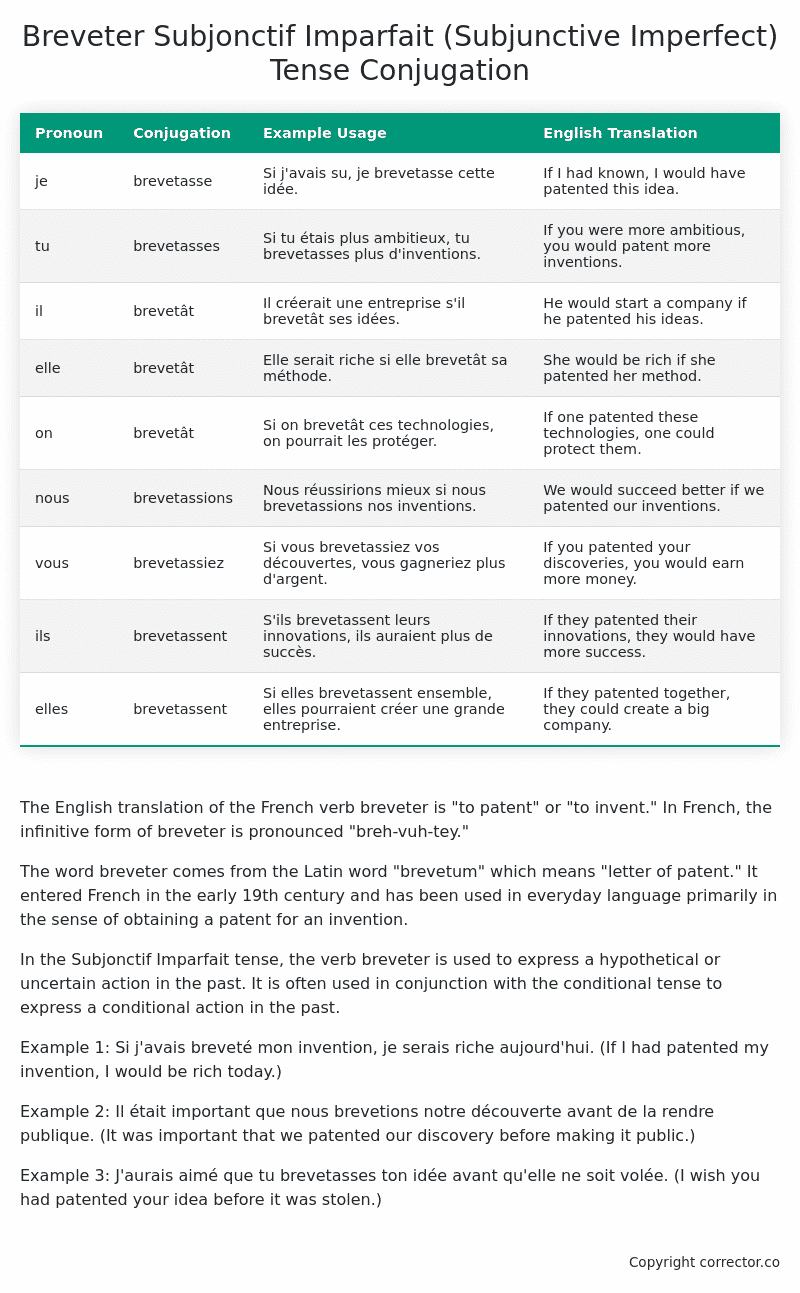Subjonctif Imparfait (Subjunctive Imperfect) Tense Conjugation of the French Verb breveter
Introduction to the verb breveter
The English translation of the French verb breveter is “to patent” or “to invent.” In French, the infinitive form of breveter is pronounced “breh-vuh-tey.”
The word breveter comes from the Latin word “brevetum” which means “letter of patent.” It entered French in the early 19th century and has been used in everyday language primarily in the sense of obtaining a patent for an invention.
In the Subjonctif Imparfait tense, the verb breveter is used to express a hypothetical or uncertain action in the past. It is often used in conjunction with the conditional tense to express a conditional action in the past.
Example 1: Si j’avais breveté mon invention, je serais riche aujourd’hui. (If I had patented my invention, I would be rich today.)
Example 2: Il était important que nous brevetions notre découverte avant de la rendre publique. (It was important that we patented our discovery before making it public.)
Example 3: J’aurais aimé que tu brevetasses ton idée avant qu’elle ne soit volée. (I wish you had patented your idea before it was stolen.)
Table of the Subjonctif Imparfait (Subjunctive Imperfect) Tense Conjugation of breveter
| Pronoun | Conjugation | Example Usage | English Translation |
|---|---|---|---|
| je | brevetasse | Si j’avais su, je brevetasse cette idée. | If I had known, I would have patented this idea. |
| tu | brevetasses | Si tu étais plus ambitieux, tu brevetasses plus d’inventions. | If you were more ambitious, you would patent more inventions. |
| il | brevetât | Il créerait une entreprise s’il brevetât ses idées. | He would start a company if he patented his ideas. |
| elle | brevetât | Elle serait riche si elle brevetât sa méthode. | She would be rich if she patented her method. |
| on | brevetât | Si on brevetât ces technologies, on pourrait les protéger. | If one patented these technologies, one could protect them. |
| nous | brevetassions | Nous réussirions mieux si nous brevetassions nos inventions. | We would succeed better if we patented our inventions. |
| vous | brevetassiez | Si vous brevetassiez vos découvertes, vous gagneriez plus d’argent. | If you patented your discoveries, you would earn more money. |
| ils | brevetassent | S’ils brevetassent leurs innovations, ils auraient plus de succès. | If they patented their innovations, they would have more success. |
| elles | brevetassent | Si elles brevetassent ensemble, elles pourraient créer une grande entreprise. | If they patented together, they could create a big company. |
Other Conjugations for Breveter.
Le Present (Present Tense) Conjugation of the French Verb breveter
Imparfait (Imperfect) Tense Conjugation of the French Verb breveter
Passé Simple (Simple Past) Tense Conjugation of the French Verb breveter
Passé Composé (Present Perfect) Tense Conjugation of the French Verb breveter
Futur Simple (Simple Future) Tense Conjugation of the French Verb breveter
Futur Proche (Near Future) Tense Conjugation of the French Verb breveter
Plus-que-parfait (Pluperfect) Tense Conjugation of the French Verb breveter
Passé Antérieur (Past Anterior) Tense Conjugation of the French Verb breveter
Futur Antérieur (Future Anterior) Tense Conjugation of the French Verb breveter
Subjonctif Présent (Subjunctive Present) Tense Conjugation of the French Verb breveter
Subjonctif Passé (Subjunctive Past) Tense Conjugation of the French Verb breveter
Subjonctif Imparfait (Subjunctive Imperfect) Tense Conjugation of the French Verb breveter (this article)
Subjonctif Plus-que-parfait (Subjunctive Pluperfect) Tense Conjugation of the French Verb breveter
Conditionnel Présent (Conditional Present) Tense Conjugation of the French Verb breveter
Conditionnel Passé (Conditional Past) Tense Conjugation of the French Verb breveter
L’impératif Présent (Imperative Present) Tense Conjugation of the French Verb breveter
L’infinitif Présent (Infinitive Present) Tense Conjugation of the French Verb breveter
Struggling with French verbs or the language in general? Why not use our free French Grammar Checker – no registration required!
Get a FREE Download Study Sheet of this Conjugation 🔥
Simply right click the image below, click “save image” and get your free reference for the breveter Subjonctif Imparfait tense conjugation!

Breveter – About the French Subjonctif Imparfait (Subjunctive Imperfect) Tense
Formation
Common Everyday Usage Patterns
Interactions with Other Tenses
Subjonctif Présent
Indicatif Passé Composé
Conditional
Conditional Perfect
Summary
I hope you enjoyed this article on the verb breveter. Still in a learning mood? Check out another TOTALLY random French verb conjugation!


